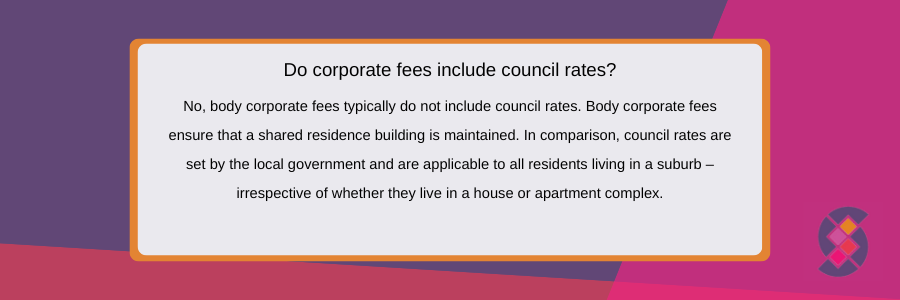Do Body Corporate Fees Include Council Rates?
If you’ve lived in an apartment or strata managed building at some point in your life, then you’ll be familiar with the body corporate. To many, the body corporate is a bit of grey area, so when it comes to understanding what they do and do not cover, there can be a lot of questions.
In this article, we’ll take a look at one of the most common questions that we receive from residents; “Do body corporate fees include council rates?”
What is a Body Corporate?
Let’s start from the top – what is a body corporate?
In simple terms, a body corporate is a business structure where multiple parties are responsible for jointly owning and managing a piece of real estate – like an apartment complex. This type of ownership is common across a range of different dwellings including apartments, condominiums (for our US readers), townhouses, or any other types of shared property.
The body corporate consists of the owners (also known as members of the body corporate). The body corporate will usually appoint a professional manager who oversees the management of the building. The representative ensures that all legal requirements are met, disputes between tenants are handled, fees are collected to pay for upkeep, and insurance coverage is arranged for the building.

Body corporate is a popular and efficient system that protects your investment in real estate and cuts down on time spent dealing with disputes or other day-to-day operational issues. It provides an efficient and reliable system that ensures the building is well cared for and that the owners’ rights are respected.
What Are Body Corporate Fees?
Body corporate fees are a regular payment that is made to cover the costs of running a body corporate – sounds simple, right?
The amount of money in a body corporate fund is determined by the contributions that are made from each unit owner.
Body corporate fees cover things like insurance, repairs and maintenance, wages for staff, and any other admin costs that are related with running a building. In general, the more complex the building (think: pool, gym, saunas, elaborate gardens), the more costly it will be to maintain.
Additionally, if the building is in poor shape and requires constant repairs and maintenance just to keep it upright, then you can also expect to pay higher body corporate fees. Before buying, it’s important to be aware of any body corporate fees so that you can factor them into your running costs.
Ultimately, the goal of body corporate fees is to ensure that the communal areas of an apartment complex are well maintained and that owners have access to important amenities like parking and swimming pools.
How Much Are Body Corporate Fees?
As the old adage goes; “how long is a piece of string?”
The cost of body corporate fees can vary dramatically and is generally determined by a number of factors. Things such as the size and complexity of the building structure, as well as the services that are required to maintain the scheme are the most important considerations in determining body corporate fees.
Body corporate fees are typically calculated on the ‘unit or lot entitlement’ system which means that each owner has an equal percentage share (based on their unit or lot entitlement) of all outgoings that are associated with the property. This calculation is based on the total annual budget, divided by the total unit entitlement, multiplied by each owner’s individual unit entitlement.
In addition to standard body corporate fees, owners may also be liable for additional levies or special assessments that are applied under special circumstances. Things like major renovations or repairs may call for additional levies to be applied. These will be outlined by the body corporate and can vary greatly depending on the nature of the project.
What Are Council Rates?
Council rates are fees that the local government charges residents to help fund services such as roads, parks, and new projects in the area. They are generally charged on a yearly basis and the amount that residents are expected to pay will depend on the size of your property and a handful of other factors.
Councils rely on these fees to provide essential services in the local community, so it is important that each citizen chips in to make it possible. Depending on your suburb or area, residents may also need to pay additional fees for waste removal services or water usage.
It’s a good idea to stay across local council rates and keep yourself informed about any changes in rates or taxes that may affect you.

Who Sets the Council Rates and How Often Do they Change?
Council rates are set by the local government. Council rates will vary depending on a range of factors including population size, average income level, and services provided. Rates are generally reviewed on an annual basis and residents are made aware of any changes hereafter.
When setting rates, local councils will consider how much revenue is needed to maintain service levels to the local community. If major work is required or new projects that impact community wellness are planned, then council rates may be higher for a calendar year to cover these costs.
Do Body Corporate Fees Include Council Rates?
So, now that you know about body corporate and council rates, we can answer the question;
“Do body corporate fees include council rates?”
No, body corporate fees typically do not include council rates. As we covered above, body corporate fees are in place to ensure that a shared residence building is maintained for all residents. While council rates are set by the local government and are applicable to all residents living in a suburb – irrespective of whether they live in a house or apartment complex.
As a rule of thumb, you should always assume that council rates are not included in body corporate fees.
Looking for more information on what is and isn’t covered by body corporate fees? Get in touch with Strata Data today to learn more about our strata management services in Adelaide.



